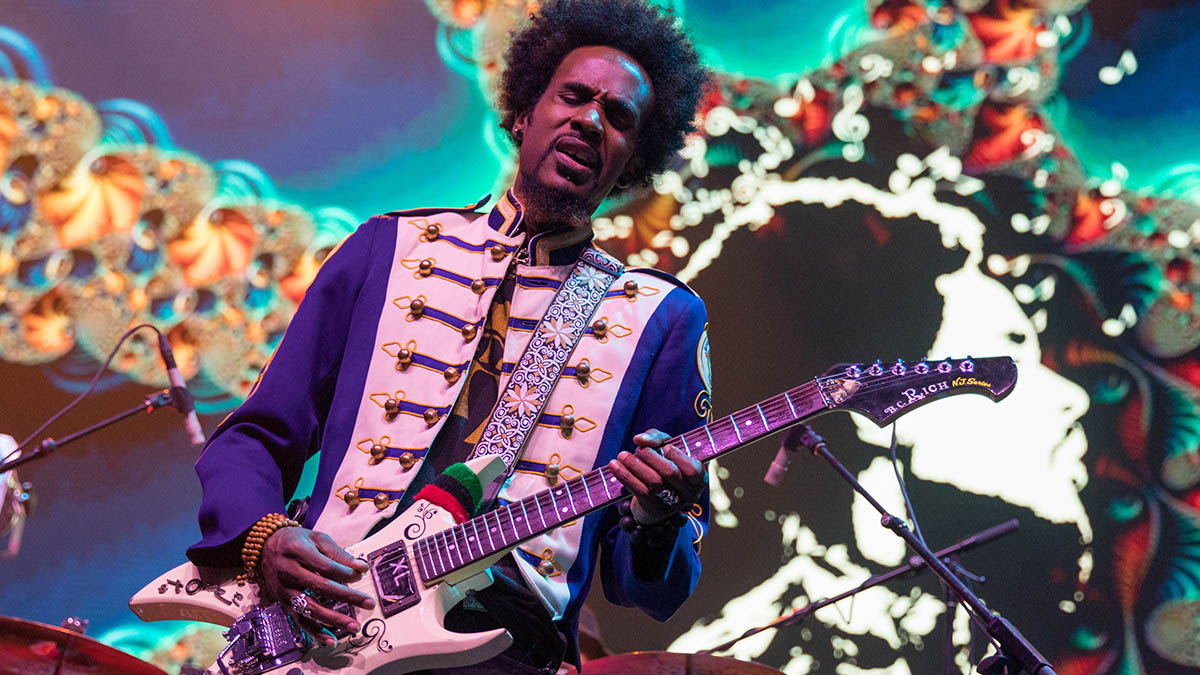
Guitar isn’t the first instrument associated with hip-hop music, but Stone Mecca has spent his career changing that narrative.
Dating back to the ’90s, Mecca has appeared on albums by Snoop Dogg, Ice Cube, Eazy-E, Wu-Tang Clan and RZA, becoming a go-to session player whenever the best of the West Coast scene needed six-strings added into the mix.
Steeped in hip-hop as he is, it was rock music that first caught Mecca’s ear.
“I loved rock,” says Mecca. “But I always listened to hip-hop, too. And then, after I learned to play guitar, I got to do a session with Ice Cube, and that’s when the whole hip-hop guitar thing out on the West Coast kicked off for me.”
It’s an interesting dynamic, given that some producers within the hip-hop community forsake the guitar.
“A lot of these guys were sampling this music first – and they didn’t know about this stuff as it pertains to the guitar,” says Mecca, when asked where the disconnect comes from.
“They didn’t know anything about instruments or scales, so there was a misunderstanding. A lot of hip-hop guys know about guitar based on what they think they’ve seen, but they don’t understand where the distortion comes from, for example.”
Despite the challenges, Mecca’s passion reigns supreme, giving him an inventive ability to inject subtle flourishes, twangy riffs and heavy metal structure into hip-hop contexts. And it’s a good thing because, despite his understanding of the rigors, things can get dicey.
“I remember going into a session with Ice Cube where he wanted me to remake an entire song,” he says. “I’d play a guitar part, and they’d say, ‘That sounds like some kind of country thing.’ And I’d say, ‘No, it’s not; it’s within the song, and it was always there, you just couldn’t hear it.’
“They wanted it out, but it’s only because their understanding of the importance of guitar wasn’t there. Most samples have guitars; they just don’t know it. So I’ve got to be able to play different types of guitar things. Whatever it is, I’ve got to be able to show up and do that each night.”
What piqued your interest in the guitar?
“I started on drums when I was around nine. Then, when I saw Eddie Van Halen playing alongside David Lee Roth, the way he played, man, it was just really sexy. I figured, ‘He must get all the women. I’m gonna learn guitar, too.’”
As I understand it, you’re self-taught. Did that impact your viewpoint?
“It helped me develop my feelings on the instrument. Teaching myself made it to where I devised exercises to build my fingers up. It helped me learn different scales and got me to a place where things sounded right rather than only focusing on what others were doing. Teaching myself made me an individual on guitar.”
Once you dug into session work on the West Coast, you ended up in the studio with Snoop Dogg.
“On the Snoop album [1999’s No Limit Top Dogg], I did that when the West Coast guys brought in many samples, which gave us more control over the mixes because everything had to be separated. I’d go in many times and try things, and I had a lot of freedom. I would play something based on what I heard and add what I thought the songs needed.”
What gear did you use while recording with Snoop – and while working on Eazy-E’s Str8 off tha Streetz of Muthaphukkin Compton?
“All I had was a Telecaster from the early ’90s. That was my first real guitar, which I had for many years. I only use it when I want the particular sound that that guitar brings. I also had a DOD Envelope Filter [FX-25] and one of those Zoom effect pedals the size of a Sony Walkman. I don’t remember the model, but it was from the late -’80s or early-’90s.”
That music is rebel music. It’s got that rebellious teenage spirit throughout, and that’s who a lot of the fanbase is, so it opens us up to rock out
What led you to work with Wu-Tang Clan and RZA?
“RZA came first; I met him around 2004 after he came to my show, and he said, 'I’m interested in signing you,' which is how it kicked off. That music is rebel music. It’s got that rebellious teenage spirit throughout, and that’s who a lot of the fanbase is, so it opens us up to rock out. But I add even more of those elements when playing live instead of in the studio because I have more freedom in concert.”
How so?
“I’m the musical director with Wu-Tang, so that makes a difference. Any band can play the music, but not just any band can take what fans hear on the albums and add something in the live setting to where people go, ‘Oh, wow.’ With that in mind, I’m always looking for ways to take what’s there and enhance it while always playing for the song.”
What guitars do you lean on most now since you don’t often use the Tele anymore?
“I found a B.C. Rich Bich from the Eighties, and it was a mess. I ended up building it out and making it my own. I used a lot of ancient Chinese secrets to make it unique. [Laughs] Just kidding. I installed a floating whammy bar and some special-wound pickups just for me, but it was so long ago that I can’t remember their names.”
What’s next for you?
“I’ve got more shows with Wu-Tang Clan, and I’ll be working on a new solo project soon. I’m always busy, man.”
- Head to Stone Mecca’s site to keep up to date.







